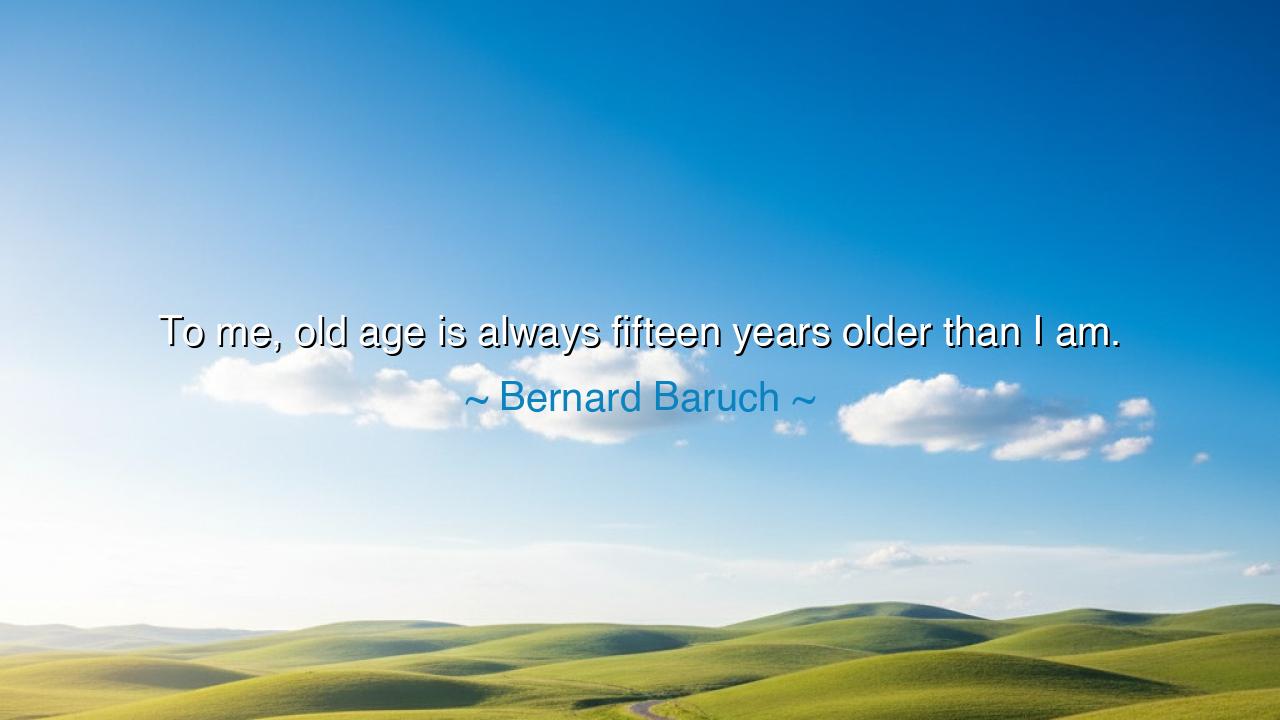
To me, old age is always fifteen years older than I am.






"To me, old age is always fifteen years older than I am." These words from Bernard Baruch are filled with both humor and wisdom, offering a reflection on the subjective nature of aging. Baruch’s quote reveals a truth we all must confront: age is not just a number marked by the passage of time, but a perception shaped by our mindset, our experiences, and our aspirations. In his statement, Baruch draws attention to how we often see old age as something distant, something that applies to others but not ourselves. For him, old age always seems a bit further than it actually is—a sentiment many of us feel, as we imagine the later stages of life as something far removed from our current selves.
In youth, we often view old age as an abstract concept—something that happens to others, not something we will experience. We feel as though time stretches before us, an endless horizon of possibility. As we grow older, we start to feel the pull of time more intensely, but it is easy to think of old age as something still in the distance, only to be confronted by it suddenly, as if it has arrived faster than we expected. Fifteen years older than we are in the present feels distant, almost unimaginable. Baruch’s words underscore the disconnect we feel between where we are now and where we perceive ourselves to be as we grow older. It is as though we are always trying to push old age away, putting it just beyond our grasp.
Think of the ancient Greek philosophers, who lived with a sense of time that was both reflective and linear. Socrates, who faced the inevitable reality of death, spoke of the importance of understanding the self and embracing the truth of our mortality. Yet even in his old age, Socrates continued to engage deeply with his students, challenging their assumptions and guiding them toward wisdom. He did not see old age as something to be feared, but as a continuation of the journey of self-awareness. For Socrates, the wisdom of old age was not a distant future but an integral part of living fully in the present. His life demonstrates that our view of age can be shaped not just by how many years we have lived, but by how we live those years.
Similarly, the life of Benjamin Franklin offers another example of this disconnect between chronological age and our perception of old age. Franklin, despite living well into his 80s, was known for his energetic pursuits—whether in science, politics, or social causes—right up until his death. To him, age seemed a relative concept, and he refused to let his years define what he could or could not achieve. Franklin’s life suggests that old age is less about a certain number of years and more about the spirit and purpose with which one lives. He did not define himself by the limitations society often places on the elderly. Instead, he maintained an optimistic view of aging, always pushing the boundaries of what he could contribute to the world, far beyond what many would have considered the usual scope of old age.
Baruch’s statement reminds us that old age is a concept often defined by perception, not by the calendar. We view old age as something that happens incrementally, something that “creeps up” on us until we suddenly realize we have arrived at a stage we never fully expected. Yet, as we age, we find that our expectations of what it means to be “old” are constantly shifting. We may be surprised to learn that age—even when marked by physical decline—does not diminish the human spirit, the will to create, to love, and to serve. Age, like wisdom, grows not as a simple number but as a way of seeing the world, as a deeper understanding of time itself.
The lesson from Baruch’s words is one of acceptance and embracing the present. Old age is not a distant, unknowable event but an ongoing process, one that we must prepare for not by fearing it, but by living with purpose and mindfulness. We can all relate to Baruch’s view of old age as something always just a little out of reach, but we must also recognize that living well today shapes how we will experience the years to come. Whether we are 20, 40, or 60, we have the power to frame our age with grace and confidence, knowing that age is less about how many years we have lived and more about the quality of the life we have chosen to live.
In our own lives, we should take this lesson to heart. Let us live each day with purpose, whether we are just beginning our journey or whether we are nearing the latter stages of life. Let us seek to embrace the aging process not as a threat, but as an integral part of the story we are writing with each moment. Just as Socrates and Franklin remained vibrant and engaged well into their later years, we too can find meaning and purpose at every stage of life. Let us remember that old age is not something to be feared or put off, but rather something to be welcomed with open arms, as a continuation of the life we are already living. Age is but a number, and it is the spirit we carry within us that truly defines us, at any age.






AAdministratorAdministrator
Welcome, honored guests. Please leave a comment, we will respond soon